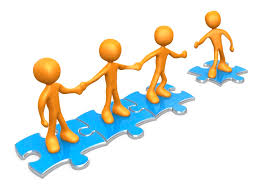In response to one of the greatest demands of the pre-adolescent population and their families at Colegio Seminario, we aim to provide them with our Magis and thus continue growing together in this important process such as the growth and maturation of your children, our students.
What do we mean by link?
The word bond comes from the Latin “vinculum"which means binding. And we ask ourselves, what does it bind us to?
Through the research of Psychiatrist and Professor Robert Waldinger, carried out at Harvard University entitled “The Grant Study”, and subsequent TED talk (watch video), the causes and foundations of a happy life are explained. This research was able to demonstrate that what fundamentally influences a person's happiness, and therefore makes them more successful and with better levels of health, is contact with others, close relationships. The pursuit of happiness It has been one of the oldest quests of humanity, to which books, articles, research, films, and years of personal and community searching have been dedicated. It is for this reason that we believe it is essential to address this topic, in order to contribute to the construction of happiness for each of our students.
Therefore we say that we are tied to an Other; a bond is a tie that remains over time. Despite the breakup or distancing, the experiences lived in the past are part of my current self and will affect my future self.
“The Grant Study” proposes three main premises for building healthy relationships.
- Quality over quantity bonds: Confluence of interests to strengthen the bond.
- Stable and mutually supportive bonds: Development of empathy and active listening to foster a sense of security and trust in the bond.
- Conflict resolution: Importance of explicit dialogue about difficulties and differences in relationships.
But… What is a quality bond? How is a stable bond characterized? When do we determine that there is mutual support? What is the best way to deal with a conflict?
It is understood that a large part of the concepts mentioned depend on the subjectivity of each person and the subjectivity of each bond formed. Each of the premises will be determined by previous experiences of success and failure in the bonds previously built, and by the demands, desires and frustrations of the person and of the people who accompanied the growth process of each one, generating certain patterns of functioning and reaction to a given action or situation. It is because of this number of variables that it is expressed on a daily basis “each relationship is a world”, given that the bonds are as complex as the people who make it up in the different bio-psycho-spiritual dimensions.
Aspects to consider before intervening in the relationships of children and adolescents:
- Experiences must be lived: Each person must go through the experiences necessary to learn from them and generate tools that allow them to deal with similar situations in adult life. The key: tolerance to frustration. This is not an innate characteristic, but rather something to be educated, practiced and exercised. When we as companions avoid the frustration of children and adolescents, we are, at the same time, avoiding the possibility of educating in frustration. This will later bring great amounts of anxiety and fears that they will not be able to face independently.
- How do our previous experiences affect the relationships that our children form? It is our previous experiences of success and failure that will shape the people we are today and the people we will be tomorrow. These will be the ones that condition the way we think, feel and act in relation to new daily experiences, both our own and those of the people under our care. It will be the experiences of failure that will teach us and protect us from future wounds, that will make us change our minds and will alert us when necessary to possible dangers or risks, and they can also work in a harmful way through fear, keeping us away from new experiences for fear of facing distressing situations. On the other hand, the experiences of success will be those that allow us to take risks and strengthen our way of thinking and facing certain situations, and they will help us gain confidence and security in the future relationships we form. This is why we invite you to take a few minutes after reading this article to think about and become aware of your own experiences previously lived that are influencing your children's relationships today. What were my friendships like? What experiences of success did I have and what experiences of failure? How did I feel? What aspects (people, personal characteristics, etc.) helped or hurt my friendships?
How to help build healthy relationships?
- Generate a space for open dialogue in the family environment: Promote moments of encounter where there is room to talk and reflect on experiences and the bonds built.
- Generate a reflective and critical awareness in children and adolescents: Help in the recognition and reflection of the strengths and aspects to work on that are related to the links already built. It is necessary that they manage to take responsibility (not blame themselves) for the links they have formed and the conflict situations experienced.
- Aspects to strengthen: the ability to assertively set limits, the recognition of one's own and others' emotions to exercise empathy, working on communicating both feelings and aspects that their children do not share with others in their group of friends.
- Confidentiality: Remember that some aspects must be worked on and addressed from an adult perspective without the need for children to be aware of them.
- Children's world, adults' world: Respect the experiences of children and adolescents and give them the importance they give them, taking into account the seriousness of the problem. As adults, we often tend to belittle the problems of children, without considering that these are a big part of their lives.

Finally, we offer you one of the possibilities that we consider most appropriate for intervening in a conflict situation.
Proposed steps:
- Talk to my son about the conflict.
- Identify the characteristics that were mobilized from the conversation with my son, in order to recognize aspects of myself that do not contribute to resolving the conflict.
- Propose agreements to follow with my child, trying to give him the opportunity to resolve the conflict independently. Here it is important to identify the aspects that we as adults must address immediately.
- Communication with the school if necessary (tutor, psychology department, actor I trust) and steps to follow.
- If you communicate with the parents of the other child, do so in an adult setting, do not involve the children in the intervention. The purpose of this conversation should be to discuss and work as a team (agree on strategies together). We suggest sharing the progress of the case (not only communicating when there are problems, but also when they are resolved).
- Recognize when the problem is resolved and when it is not. Do not hold a grudge when children have decided to forgive.
- If necessary (more complex cases), seek professional help to guide parents and the child. In this case, we invite you to rely on the guidance of the school to evaluate the relevance of an external consultation.
Ps. Maria Noel Gonzalez Farina
